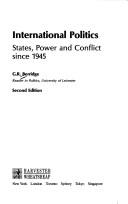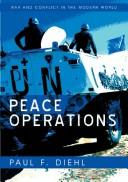| Listing 1 - 10 of 105 | << page >> |
Sort by
|
Book
ISBN: 9780415586276 9780203834541 9781136850165 9781136850202 9781136850219 9780415532440 0415586275 Year: 2011 Publisher: London: Routledge,
Abstract | Keywords | Export | Availability | Bookmark
 Loading...
Loading...Choose an application
- Reference Manager
- EndNote
- RefWorks (Direct export to RefWorks)
This book explores attempts to develop a more acceptable account of the principles and mechanisms associated with humanitarian intervention, which has become known as the ‘Responsibility to Protect’ (R2P). Cases of genocide and mass violence have raised endless debates about the theory and practice of humanitarian intervention to save innocent lives. Since the humanitarian tragedies in Rwanda, Burundi, Bosnia, Kosovo and elsewhere, states have begun advocating a right to undertake interventions to stop mass violations of human rights from occurring. Their central concern rests with whether the UN’s current regulations on the use of force meet the challenges of the post-Cold War world, and in particular the demands of addressing humanitarian emergencies. International actors tend to agree that killing civilians as a necessary part of state formation is no longer acceptable, nor is standing by idly in the face of massive violations of human rights. And yet, respect for the sovereign rights of states remains central among the ordering principles of the international community. How can populations affected by egregious human rights violations be protected? How can the legal constraints on the use of force and respect for state sovereignty be reconciled with the international community’s willingness and readiness to take action in such instances? And more importantly, how can protection be offered when the Security Council, which is responsible for authorizing the use of force when threats to international peace and security occur, is paralyzed? The author addresses these issues, arguing that R2P is the best framework available at present to move the humanitarian intervention debate forward. This book will be of interest to students of the responsibility to protect, war and conflict studies, human security, international organisations, security studies and IR in general. 1. Introduction: Humanitarian Intervention and the Responsibility to Protect Part 1: R2P’s Theoretical Weight 2. The Responsibility to Protect: Sovereignty and Human Rights3. Who Authorizes Interventions?4. Who Conducts Interventions? Part 2: R2P’s Practical Dimensions 5. From Concept to Norm6. From Normative Development to Implementation7. Conclusion. Bibliography Christina Gabriela Badescu’s work provides a meticulous analysis of the debate over humanitarian intervention and the Responsibility to Protect. The author takes the reader by the hand and carefully walks them through the subject matter. From this, a systematic, step-by-step analysis is developed, which provides an accomplished overview of the issues involved. . the volume provides a superb over-view and is a book that I recommend strongly to those both familiar and unfamiliar with all things R2P. – Adrian M. Gallagher, University of Leicester, Political Studies Review, Vol 10:3, Sept. 2012 Summing Up: Recommended. Upper-division undergraduates and above. --P. J. Stoett, CHOICE (February 2012) Cristina Gabriela Badescu teaches peace and conflict studies at the University of Toronto, Canada. Her research interests include international relations, human security, transitional justice, and the responsibility to protect.
Book
ISBN: 9789089538697 Year: 2016 Publisher: Amsterdam Uitgeverij Boom
Abstract | Keywords | Export | Availability | Bookmark
 Loading...
Loading...Choose an application
- Reference Manager
- EndNote
- RefWorks (Direct export to RefWorks)
Overal om ons heen zien we een wereld in transitie: van de eurocrisis en de terugkeer van een machtig Rusland tot de onrust in het Midden-Oosten en de economische opkomst van China. Volgens Haroon Sheikh zijn het tekenen van het einde van het Atlantische tijdperk. Eeuwenlang lag het zwaartepunt van de wereld bij de westerse landen die de Atlantische Oceaan domineerden. Op dit moment verschuift de macht naar het Oosten. In Duitsland, Oost-Europa, Rusland, Turkije, Iran en China onderzoekt Sheikh de economische en geopolitieke veranderingen die op de Euraziatische vlakte plaatsvinden. Oude tradities, rijken en handelsnetwerken als de Zijderoute worden in dit gebied nieuw leven ingeblazen. De opkomst van het Oosten is een studie naar de contouren van de nieuwe wereldorde, bedoeld voor iedereen die de verhoudingen in onze hedendaagse, snel veranderende wereld wil begrijpen.
International relations. Foreign policy --- International economic relations --- Eurasia --- 240 Internationale politiek --- Sociaal-cultureel werk --- Radicalisme --- Sociaal werk --- Politiek, internationaal
Book
ISBN: 9025406637 Year: 1994 Publisher: Amsterdam, Antwerpen Contact
Abstract | Keywords | Export | Availability | Bookmark
 Loading...
Loading...Choose an application
- Reference Manager
- EndNote
- RefWorks (Direct export to RefWorks)
Civilisation --- oorlogen --- Polemology --- 355.01 --- 327 <100> --- #KVHB:Oorlog --- #KVHB:Conflicten --- #KVHB:Polemologie --- NATO --- defensie --- geschiedenis --- oorlog --- politiek, internationaal --- vrede
Book
ISBN: 1857881354 Year: 1996 Publisher: London : Nicholas Brealey,
Abstract | Keywords | Export | Availability | Bookmark
 Loading...
Loading...Choose an application
- Reference Manager
- EndNote
- RefWorks (Direct export to RefWorks)
economische politiek --- economie, internationaal --- politiek, internationaal --- globalisering --- prognoses wereldeconomie --- democratie --- kapitalisme --- islam --- Japan --- vergrijzing --- informatietechnologie --- markteconomie --- Doctrine politico-économique
Book
ISBN: 9076421048 Year: 1998 Publisher: Antwerpen Wereldwijd
Abstract | Keywords | Export | Availability | Bookmark
 Loading...
Loading...Choose an application
- Reference Manager
- EndNote
- RefWorks (Direct export to RefWorks)
C2 --- missie --- ontwikkelingssamenwerking --- toekomst --- duurzame ontwikkeling --- globalisering --- noord-zuiddialoog --- ontwikkelingshulp --- ontwikkelingslanden --- politiek, internationaal --- Religieuze instituten --- Development aid. Development cooperation --- Ontwikkelingssamenwerking/ ontwikkelingsbeleid (derde wereldproblematiek,noord-zuid-verhouding)
Book
ISBN: 9075376316 Year: 2002 Publisher: Leuven : KUL. Centrum voor vredesonderzoek en strategische studies,
Abstract | Keywords | Export | Availability | Bookmark
 Loading...
Loading...Choose an application
- Reference Manager
- EndNote
- RefWorks (Direct export to RefWorks)
Development aid. Development cooperation --- Law of armed conflicts. Humanitarian law --- Academic collection --- #SBIB:327.5H20 --- oorlog --- vrede --- conflict --- politiek, internationaal --- Vredesonderzoek: algemeen --- Armistices --- Manuels, ...

ISBN: 0745009875 9780745009872 Year: 1992 Publisher: Brighton (Suss.): Wheatsheaf books,
Abstract | Keywords | Export | Availability | Bookmark
 Loading...
Loading...Choose an application
- Reference Manager
- EndNote
- RefWorks (Direct export to RefWorks)
International relations. Foreign policy --- World politics --- politiek, internationaal --- diplomatie --- economie, internationaal --- oorlog --- geopolitiek --- geschiedkundige beschrijvingen --- Verenigde Naties --- World politics - 1945 --- -World politics
Book
ISBN: 9075376065 9789075376067 Year: 1996 Volume: 47 Publisher: Leuven: KUL. Centrum voor vredesonderzoek,
Abstract | Keywords | Export | Availability | Bookmark
 Loading...
Loading...Choose an application
- Reference Manager
- EndNote
- RefWorks (Direct export to RefWorks)
Academic collection --- #SBIB:328H312 --- 323 <71> <714> --- Canada --- etnisch-culturele minderheden --- politiek, internationaal --- vrede --- Instellingen en beleid: Canada --- Gouvernements federaux --- Québec (canada, province) --- Politique et gouvernement

ISBN: 9780745642079 9780745642062 0745642071 Year: 2008 Publisher: Cambridge: Polity press,
Abstract | Keywords | Export | Availability | Bookmark
 Loading...
Loading...Choose an application
- Reference Manager
- EndNote
- RefWorks (Direct export to RefWorks)
Peace-building --- Peacekeeping forces --- conflict --- politiek, internationaal --- vrede --- 856 Conflictbenadering --- Peacekeeping (Military science) --- Peacekeeping operations --- Armed Forces --- International police --- Building peace --- Peacebuilding --- Conflict management --- Peace
Book
ISBN: 9780521708401 0521708400 Year: 2009 Publisher: Cambridge: Cambridge university press,
Abstract | Keywords | Export | Availability | Bookmark
 Loading...
Loading...Choose an application
- Reference Manager
- EndNote
- RefWorks (Direct export to RefWorks)
staatswetenschappen --- staatstheorie --- maatschappijwetenschappen, methoden --- politiek, internationaal --- Comparative government --- Comparative political systems --- Comparative politics --- Government, Comparative --- Political systems, Comparative --- Political science --- Comparative government.
| Listing 1 - 10 of 105 | << page >> |
Sort by
|

 Search
Search Feedback
Feedback About UniCat
About UniCat  Help
Help News
News